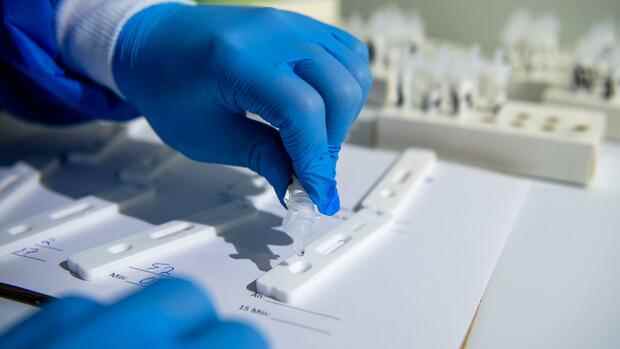Frankfurt About 90 percent of the common rapid corona tests should work just as well with the omicron variant as with the earlier variants of the Covid pathogen. Experts from the Paul Ehrlich Institute (PEI) came to this conclusion after a detailed analysis of tests with regard to their sensitivity to the currently predominant virus variant.
“The investigations of the PEI give no indication of a reduced sensitivity of the antigen rapid tests compared to Omikron. The sensitivity is analogous to that of the wild-type or the delta variant,” said Micha Nübling, head of the department for fundamental questions at the PEI, on Thursday at a press conference of the institute. According to the institute’s assessment, the previous evaluations of rapid tests can be transferred to the vast majority of the available tests, also with regard to the omicron variant.
According to the PEI, a number of other analyzes had come to similar results. On the other hand, statements by the US Food and Drug Administration (FDA) and investigations by some academic laboratories, such as those in Switzerland, recently raised doubts about the reliability of the antigen tests.
Top jobs of the day
Find the best jobs now and
be notified by email.
In its new analysis, the PEI did not re-examine all of the 245 rapid tests that have already been evaluated, but only a sample of 20 of these tests with different but consistently sufficient sensitivities. The result: tests that showed high sensitivity to infections with the original variant of the virus (the so-called wild type) and the delta variant also reacted with high sensitivity to the omicron variant.
Rapid tests with a lower, albeit still sufficient, sensitivity also showed a correspondingly lower sensitivity for the omicron variant.
The experts at the PEI assume that these results can largely be applied to the other tests that were not examined separately, and that the test qualities determined so far will also remain valid at Omikron.
Rapid test sample should be transferrable to other tests
On the one hand, the type of gene mutations that occurred in the omicron variant and, on the other hand, the functionality of the tests support this conclusion. Unlike the more sensitive PCR tests, antigen tests do not aim to detect viral RNA or DNA, but to detect viral protein.
For this purpose, so-called antibodies, which bind specifically to certain virus proteins, are applied to the test strips. If the sample contains virus proteins, they stick to the corresponding spot on the test strip and the visible colored stripe appears.
>> Read here: These five factors determine how severe a Covid infection is
Almost all rapid tests do not target the spike protein of the virus, which has been severely mutated in the case of Omicron, but rather the so-called nucleocapsid protein, which encapsulates the genetic information of the virus. In the case of the omicron, this protein is mutated in only four places (in the Ba1 variant) or in five places (in the Ba2 variant) – and only in regions that have nothing to do with the core function of the nucleocapsid protein.
In order to further underpin the transferability of the PEI analysis, the Federal Institute for Drugs and Medical Devices (BfArM) also asked manufacturers about the specific design of their tests. According to the PEI, it was found that of the 428 listed tests for which the manufacturers provided relevant information, 385 work with antibodies that do not bind to protein areas that are affected by mutations.
From the experts’ point of view, it can therefore be assumed that these tests will not be impaired in their functionality by Omikron. They are therefore now marked accordingly in the overview of the BfArM.
43 tests are to be checked again by manufacturers
For 43 tests that may be affected by omicron mutations, however, the BfArM is now demanding additional validation of omicron detection by the manufacturer.
Rapid antigen tests play an important role in the fight against pandemics as a supplement to the much more precise but also more time-consuming PCR tests. The main advantage of the rapid tests is that they provide a result very quickly – usually within 15 minutes – and can be carried out without special laboratory equipment.
>> Read about this: New corona variant: how dangerous is Deltakron?
From the point of view of the PEI, it is crucial that rapid tests detect the higher and thus infectious viral loads in the initial phase of Covid diseases with a sufficiently high degree of reliability.
A sensitivity of at least 80 percent and a specificity of 97 percent are officially required for reimbursement of the costs of rapid antigen tests. The sensitivity of a test indicates the percentage of the actually positive samples in which a pathogen is detected by the test. The specificity, in turn, measures the probability with which the test identifies a sample without virus material as such.
This means that a test should actually detect at least 80 percent of the positive samples and show a false-positive result in at most three percent of the negative samples.
More: New Corona Test Ordinance – What is in it and what needs to be considered.
